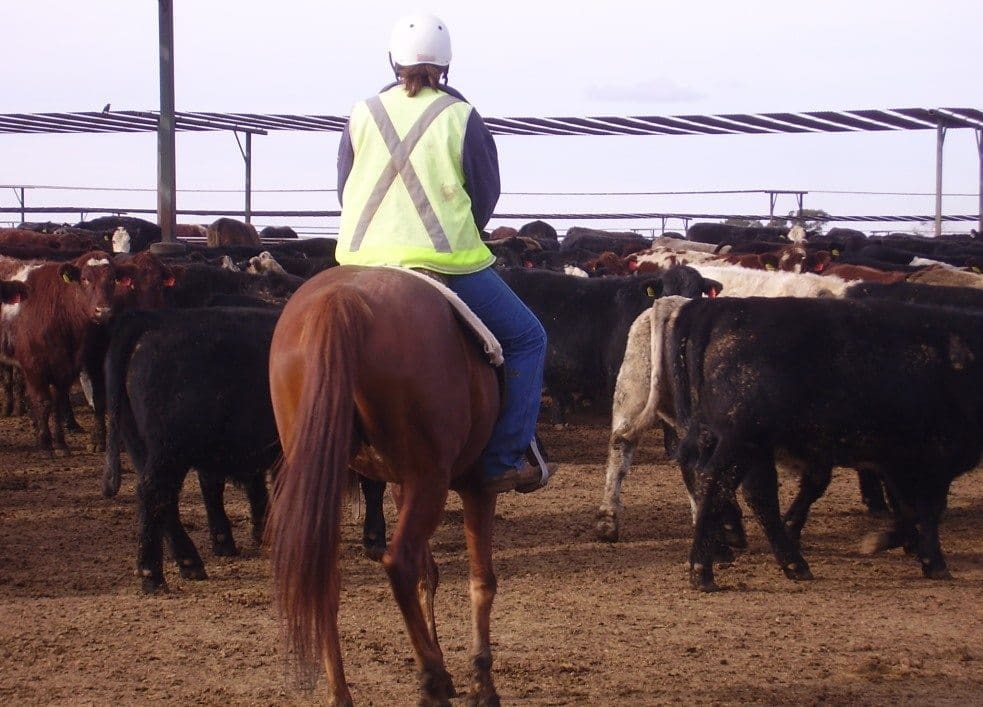Latest listings on Jobs Central
- Feed Mill Supervisor (Agricultural Appointments client)
- Farm Supplies Sales Manager, Charters Towers (Elders)
- Business Development Manager (Agricultural Appointments client)
- Sales Manager – Pork (JBS Australia)
- Station Positions – Calton Hills, via Mt Isa
- Road Train Drivers (MC) – Livestock (Road Trains Australia)
- Environmental Officer – Livingstone Beef ((AA Co)
- Head Stockperson – Naryilco (S. Kidman&Co)
- General Manager (Santa Gertrudis Breeders Assn)
- Overseer – Upper Gascoyne region (Central Stockcare Pastoral)
- Pen Rider – Condamine QLD (Meat Processors Group client)
- Stationhand couple (Stockport Pastoral Co)
Click here to access these and other exciting meat and livestock supply chain jobs currently listed on Jobs Central.

There are good reasons for the high number of females employed as pen riders across the Australian feedlot industry
LET’S face it – we all know there aren’t nearly enough women in leadership positions in agriculture sector roles in Australia, despite a wealth of evidence that shows it makes good business sense.
Top-tier male and female agribusiness leaders and managers are pushing for organisations to do more to support gender diversity in the workplace, urging leaders to set an example from the top down.
Rather than waiting for someone else to fix this, rather than waiting for regulation, the beef industry should take its destiny into its own hands and start implementing plans and/or strategies to include and entice more talented women into positions in the agriculture sector.
That’s not to say there is not good progress already being made.
Take a look at any large feedlot’s livestock team, and you’ll inevitably see a heavy representation of females among the pen riders. Why? The most common explanation is ‘attention to detail’, ‘ability to multi-task,’ and a natural sense of ‘caring/nurturing.’
Similarly, many large pastoral companies now have as many females among their annual recruiting intake for ‘new starters’ as males.
Some even rise through the ranks to positions of seniority. Reference Sheep Central’s story published last year profiling the achievements of Consolidated Pastoral Co’s trailblazing station manager Emily Anderson – arguably the first female station manager for any major pastoral company in Australia.
Here’s some tips on how to correct the gender imbalance in the beef supply chain workplace:
Identify the women you work with
Firstly, do what you can to develop the skills and networks of women around you. Become personally involved in mentoring and sponsoring women. If you’re attending a business event, ensure women you work with or associate with come too.
Make diversity a priority
Make gender diversity a priority for your business – if diversity isn’t a business priority, nothing will be achieved. It needs to be taken as seriously as meeting budget, health and safety and expenses. Managers need to have clear targets as they aim for diversity and relentlessly measure results and revise strategies.
Be transparent
Establishing open lines of communication and encouraging the women in leadership roles in a business to share their stories is crucial to boosting the numbers of women in leadership. Those stories should be transparent about everything – how they got to where they are, and told in a way which opens up the system for everybody to be able to step forward and create a more inclusive culture.
Lead from the top
What is the composition in your business’s senior ranks? Woman in top roles can be key drivers in advocating other women to join your company. If the women in your business believe there is a critical mass of women in the leadership team, they’re five times more likely to advocate for the company. In the war for talent, that is a very compelling message.
Seek out women with potential
People need to seek out and sponsor women to help them climb the leadership hierarchy. Women subconsciously don’t always promote themselves, for a range of reasons. So managers need to focus on who those talented women are and make sure strategies are in place to attract them to the business.
Communicate with the women in the business
Businesses need to be having constant conversations with their staff to ensure they’re aware of any problems in the business. The more managers listen and debate, the more they learn what the real problems are. It is also essential to have programs which allow managers to see real talent right throughout the organisations and to protect it.
End of financial year is often a time when agribusinesses tend to look at gender balance in the staff ranks, and the renewed push to further gender diversity. Let’s be smart about the goals we want to achieve and make it a priority for the coming financial year.
Source: Meat Processors Pty Ltd – Managed Workforce

HAVE YOUR SAY